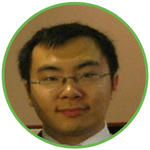Biomarker and Alzheimer disease: role of high sensitivity assays and the applications
Alzheimer disease is a devastating neurodegenerative disease, which is the only one amongst the top 10 deadly diseases that has almost no treatment. FDA approved ADUHELM® from Biogen in 2021 was the first approved Alzheimer treatment in the past 2 decades.
Current treatment plans focus on two strategies, preventing the formation and aggregation of plague proteins called amyloids and taus, or removing such proteins. ADUHELM® adopted the later pathway. Meanwhile, from the diagnostic point-of-view, we are slightly ahead of time compared with the treatment, thanks to various new technologies. In particular, highly sensitive technology and platforms enable early diagnostics.
It has been said that the diagnosis of Alzheimer disease enters the era of biomarkers. These two biomarkers, amyloids and taus, defines Alzheimer disease. This presentation will focus on highly sensitive protein biomarker assays developed and validated at a testing laboratory and its application for the diagnosis of Alzheimer disease.
What will you learn?
- Alzheimer disease biomarker, types and grouping
- Development, validation of protein Alzheimer disease biomarker assays
- High sensitivity assay platforms and the future of diagnostics
- Potential companion diagnostics using protein biomarkers for Alzheimer disease
Who may this interest?
- Pharmaceutical professionals
- Biomarker and bioanalytical scientists
- Outsourcing manager for biomarker tests
Speaker

Dr Kai Wang
Senior Director of Biomarker Services
Frontage Laboratories (NJ, USA)
Dr Kai Wang is Senior Director of Biomarker Services at Frontage Laboratories, Inc and has been with Frontage since 2014. His current research focus is in the area of biomarkers assays, laboratories developed tests (LDT) and companion diagnostic. Dr Wang serves as an editorial board member for the Journal of Applied Bioanalysis. Dr Wang earned a doctor of philosophy degree in chemistry from Rutgers University–New Brunswick (NJ, USA) and received a bachelor of science degree in chemistry from Nanjing University (China).
In association with
